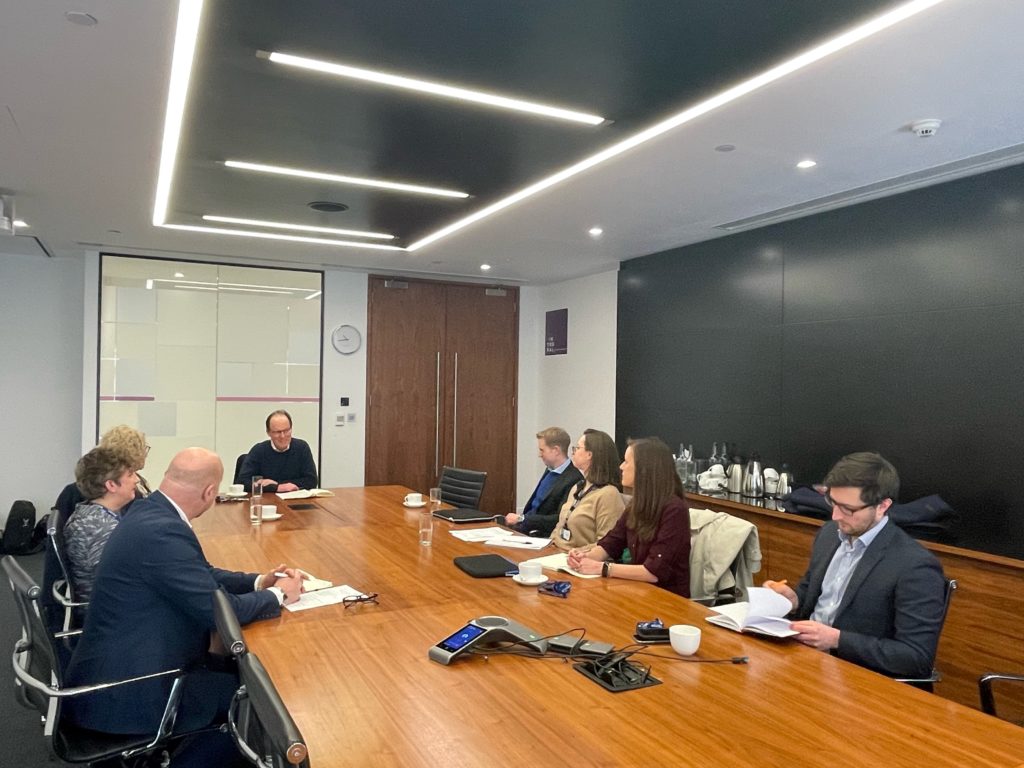Climate Change and Commercial Real Estate Transactions – A Special Round Table

We were delighted to join with leading property search provider Search Acumen to host the first of a series of round tables on the potential impact of climate change on commercial real estate property transactions.
Chaired by the renowned Environmental Lawyer, Stephen Sykes, a group of expert commercial lawyers gathered in London to explore the potential risks and liabilities that may arise with client care guidance on how this could affect decisions, together with the data and assessment needed to support it.
In a wide-ranging debate, some of the key conclusions of climate change and commercial real estate transactions were:
- A joined-up approach from across the wider Property Sector is required to help residential and commercial property clients to better understand the climate risk to their properties.
- Environmental data needs to encompass potential climate impacts and be presented in as friction-free a way as possible to assist client care and compliance with other stakeholders
- Climate risk know-how is highly variable across different law firms – as is the willingness / appetite of law firms to engage in this and to advise clients accordingly, with some firms reluctant to engage.
- The risk of being sued for failing to alert clients about climate risk should not be ignored. Consequently, PI Insurance may be an important and underappreciated market driver for lawyers to take this matter more seriously.
- Lender compliance pressure on lawyers in relation to climate risk is not (yet) being felt by property lawyers, but further clarity as to their requirements is expected.
Joined-Up Approach Needed
The panel felt that lenders, property professionals (lawyers, surveyors, consultants and valuers), together with environmental data providers and insurers should all work together and develop guidance as to how climate change should be dealt with.
The current siloed approach to make sense of the real estate impacts of climate change could undermine the endeavours of some professionals to set out good practice guidance.
There may be a case for separating land and buildings – with surveyors taking a lead in advising clients as to the impacts of climate change on buildings (e.g. matters such as costs to remedy for retrofitting following the EPC rating – and a need to improve in order to secure better mortgage terms or products).
Katherine Crowley, Womble Bond Dickinson: “Lawyers shouldn’t comment on impacts to value due to climate risks. We don’t inspect buildings – this is the domain of the surveyor and perhaps could be provided earlier in the transaction.”
Helene Maillet-Vioud, Geldards: “Where lawyers could come in is around developing suitable clauses to deal with the particular transactional issues raised in this area and building on the “green” clauses that have already emerged. It is also likely that in any appropriate guidance lawyers have a role to play in “signposting” clients to the potential climate change issues, how to mitigate these and what lenders requirements are and/or minimum standards apply.”
Environmental and Climate Data
The panel was clear that climate and environment data are one and the same and there is an expectation that geophysical impacts would be considered holistically.
Katherine Crowley: “Lawyers are keen to keep things simple. They want to see a ranking system for climate risks – traffic lights or high, medium and low risks. If a site is high risk, they want to know what – if anything – can be done to lower the risk. So, they want clear recommendations. What we don’t want are ever more reports requiring us to have to stop and interpret what it means over and above a format that we are familiar with.”
“Lawyers don’t want to present a risk that they don’t feel qualified [to talk] about – we cannot answer the interpretation and are not scientists. So, it is about clarity and confidence with the guidance contained in it and the ability to easily translate that to the client. Flooding and subsidence have a clear linkage with climate and guidance that supports it, but any extra advice must be in line with our PI rules.”
Stephen Sykes posed the question about what standard should be applied for client care, but it was felt that no guidance had yet defined it. “Lawyers are caught between a rock and a hard place. Complex liabilities need to be understood – at what point do we need to be alert to the “what if?” in a transaction and what do we say to our client?”
Charlie White, Bird and Bird: “Colleagues are interested but not instructed to go beyond the environmental search and also to refer to the professional opinion on any impacts to value from the surveyor. Lawyers feel that they do not have that level of understanding, but there is a role for better education and guidance here for sure.”
David Kempster, Groundsure: “The recent Law Society Resolution released around the time of COP26 was designed to provide a framework for firms to think about how they act in relation to the environment. This provided a clear steer on how partners should be preparing their compliance and ESG plans, but also with the advice that they provide and the third party data they use.
Section 3 highlights the importance of using data that is best suited to meeting client care needs in a way that is clear and straightforward. Education is part of this, but so are actionable outcomes in plain English that can be passed onto the client with confidence.”

Highly Variable Climate Risk “Know-how”
The level of understanding of and responsiveness to climate risk varies from firm to firm. There was a strong sense from the panel that some law firms just don’t get it in terms of the need to give advice; and some lawyers may not have time to think it all through whilst some will try to caveat their advice to discharge their liability.
Stephen Sykes, Capital Law: “Some firms take a fairly reactive approach. They seek to cut down the scope of their advisory services to exclude environmental matters and may do the same when it comes to advising on climate risk, unless they are compelled / mandated to do so by the Law Society and / or lenders and / or their insurers. Their argument seems to be that they aren’t competent to advise on these matters. These firms have overstretched PSLs who might not have the capacity to think through a complex and multi-faceted subject like climate risk. You get the impression that they need very simple solutions.
But some firms are making a difference in this space and know that they need to engage with climate risk and develop practices to manage it. I suspect that these proactive, forward-thinking law firms are also the ones who understand how corporate risk is being rewired by ESG. They are on top of this risk and the underlying law. They understand that it is not acceptable to leave clients adrift to understand and manage these significant albeit long term risks.”
Professional Indemnity Risk
The panel felt that providing information about climate change impacts would be meaningful if you could highlight the impact to the value of the land or the business. This may actually provide the client with a valuable commercial opportunity – e.g. land close to a coast affected by sea level rise may have short term cost benefits for some uses, as long as the longer term risk is understood and “baked in”. But where does the lawyer stand with their PI with this kind of advice?
Michelle Radcliffe, CMS Nabarro Olswang: “Lawyers are alive to climate change risks. The central issue is the extent to which they can adequately advise on such risks, which is why a joined-up approach with other experts is desirable. If clients have an appetite to go ahead with certain investments, then they will want better knowledge of when and how the risk “kicks in”.
‘A question arises as to the scope of a solicitor’s retainer, and the extent to which there could be allegations of professional negligence in circumstances where a solicitor has not warned of any potential risks stemming from climate change. This then leads to the point made by Katherine, as to what solicitors are able to advise on, given they are not technical experts in this area.
One thing we do know, is that a Board level, there is increasing focus on climate risk. Whilst courts have yet to consider the circumstances in which a failure to consider and manage climate risk could be a breach of s172 and s174 of the Companies Act, the risks posed by climate change (and the litigation risk) is such that directors are likely to consider climate risk when making investment decisions. From a property investment perspective, consideration needs to be given to both the physical risks of climate change, and the transition/policy risks of adjusting to a lower-carbon economy.”
Better Professional Guidance
The panel felt that improved guidance for client care is required, as well as being more joined up with other stakeholders, especially lenders and valuers. They would want significant input to any guidance, whether enhanced on existing environmental matters (such as flooding and ground stability), but crucially on the wider advice that can and should be provided within the scope of PI liability.

The panel also felt that there would be greater compliance requirements from lenders being passed on, such as amendments to the Conveyancing Handbook – there are few signs of this yet but must surely be a matter of time.
Helene Maillet-Vioud: “Lenders want to limit their exposure to risk as much as possible, so current lender requirements are generally quite widely drafted. Currently they typically instruct lawyers “to do all the usual searches” and advise them on the risks and how best to mitigate them.
Clearly, if there were a requirement for this to apply to “climate risk” more broadly, this would be a big cause for concern to conveyancers around the UK. Beyond the limited environmental and contamination searches that we currently do there are no market friendly climate risk reports or insurance policies that we could turn to so how could we sensibly and cost effectively advise our clients?”
Charlie White: “Lender credit teams have a lot of sway, with the bigger clearing banks having ESG teams. They will be increasingly relaying requirements as to what is suitable for lending and how this is reflected in their overall climate risk appetite. This, in time, will determine how things change in terms of our role, at the same time as the client has gain greater consciousness about climate through the media, COP26 etc.”
Michelle Radcliffe: “The Bank of England carried out a Biennial Exploratory Scenario in 2021 to look at the financial risks from climate change, and launched a second such exercise in February of this year, with a focus on participants’ proposed management actions in response to climate scenarios. This includes a look at the size of the financial exposure to climate-related risks.
This requires banks and insurers to look at their portfolios and how they may be impacted by the potential risk of climate change, which will include a review by banks of the risks to their mortgage books. Lenders, investors and insurers are all looking at the impact of climate change on property portfolios.”
Caroline Robinson, Search Acumen: “It is imperative that a wide range of lawyers and stakeholders including lenders, valuers and surveyors are part of this discussion phase feeding into any future guidance for lawyers on climate change advice if we are to have a meaningful and pragmatic solution.
It is important that any data output not only identifies the problem/issue but signposts the routes to a solution and that these issues are highlighted at the right point in the transaction, with the right professional, so as not to cause unnecessary delays.”
Edmund Barnes, Newmanor Law: “This was a really useful forum to understand how advice and data could be best managed in relation to client care and ongoing compliance. I look forward to understanding how any future guidance may shape our roles for legal oversight as well as clarity on who delivers the technical advice and in what format.”
Join in the Debate
Groundsure are also hosting The Conveyancing Climate Change Conference on 14th June at the Law Society. These issues and more will be discussed with some of the leading experts across the property sector. Find out more and register now
The commercial real estate panel proposes to meet again later in the summer to review progress made on stakeholder guidance, practical examples where data could be used to advise clients more effectively on exposure to potential climate risk and satisfy compliance requirements. There is also an opportunity to help shape and influence any future guidance in this area.
If any commercial real estate lawyers, PSLs or Knowledge Managers are interested in joining the group, then please get in touch.
Keep up to date with Groundsure by following us on Twitter.
Date:
May 17, 2022
Author:
David Kempster


